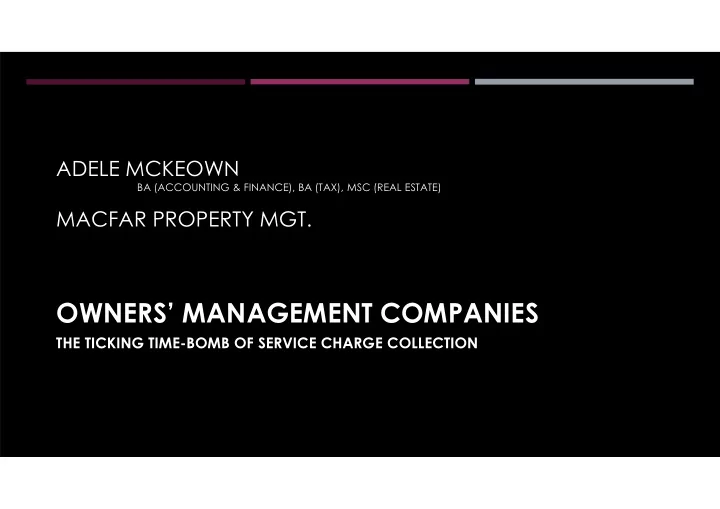

ADELE MCKEOWN BA (ACCOUNTING & FINANCE), BA (TAX), MSC (REAL ESTATE) MACFAR PROPERTY MGT. OWNERS’ MANAGEMENT COMPANIES THE TICKING TIME-BOMB OF SERVICE CHARGE COLLECTION
THE RESEARCH Having noticed a trend in the payment pattern relating to service charges I decided to undertake more in-depth research in the area. The trend that I had observed seemed to indicate that there were three distinct groups: � Those who pay on time annually and fully understand their obligations � Those who do not fully understand the system however will pay when encouraged to do so � Those who wont pay for a variety of reasons In conducting my research I interviewed a number of stakeholders involved in property management including agents, directors and accountants. I then surveyed 80 Owners Management Company members and profiled the accounts of 50 OMCs.
THE ISSUES FOR OWNERS’ MANAGEMENT COMPANIES 1. Transience – buy-in from non-owners; impact of sense of community; investor vs owner-occupier; who is relationship with? Handing over of common areas – despite MUD Act, many developers haven’t handed over the common areas (6 2. noted in accounts); remedies insufficient; role of receivers?; responsibility for maintenance? Sinking fund – houses vs apartments?; c.40% OMCs in my research do not have sinking funds established; fire and 3. strategic maintenance; MUD sinking fund is too small and changeable at AGM; priorities for sinking fund – who takes the decisions? Data – limited data on OMC company registrations; RTB data deficiency on identifying tenancies in OMC. 4. Debt/service charge collection - 5.
SERVICE CHARGE/DEBT COLLECTION GENERAL ISSUES – Statute of limitations; Limited service as argument for non-payment; Interest awards; Limited methods of redress; Role of banks/mortgagor; Lack of awareness.
SERVICE CHARGE/DEBT COLLECTION SPECIFIC ISSUES (Members’ Survey) What do the members think? SC owner occupier 85% apt owners were aware they had to pay service charges when they purchased the property vs 68% of house owners � 55% of house owner-occupiers happy to pay S.C. vs 80% apt owner-occupiers � SC investors Only 80% apt investors understood obligation to pay SC when purchasing property � Nearly half felt SC was not value for money � 26% of house owners and 43% of apartment owners were familiar with the MUD Act (2011). � Paying owners subsidise non-paying owners. �
SERVICE CHARGE/DEBT COLLECTION SPECIFIC ISSUES (Accounting Analysis) � 18% of the management companies analysed had a debtors level that represented less than 10% of their annual budget; � 52% had a debtors level between 10% and 50% of their budget. � 18% of the accounts analysed showed a debtors level between 51% and 100%. � 12% of accounts recorded a debtors level in excess of the total income needed to run a development for one financial year.
RISK OF INSOLVENCY The analysis examined the debtors level in each set of accounts and comparing it with the previous financial period. � In 23 of the accounts the debtors level had decreased when compared with the previous financial period, while in 27 OMCs the debtors level had increased. � 29 of the developments had a sinking fund provision specifically set aside in a designated bank acc. � 30% of the accounts analysed recording debtors levels that are greater than 50% � In many cases 20% of the members owed 80% of the debt. � The structure under which OMCs in Ireland have been set up means that there is an interdependence between unit owners, with the research indicating that approximately 20%-30% of unit owners do not pay their service charges on time and are in an arrears situation.
REASONS FOR NON PAYMENT Reasons cited by interviewees for owners not paying their service charges included � Economic factors; � A general unwillingness to pay; � Services in a MUD are not easily withdrawn, � Lack of understanding by people; � The ‘free rider’ theory – people feel that they can get away with not paying if everyone else is subsidising them.
BAD DEBT PROVISION � Only two of the 50 developments had a provision for bad debts. � Many of the agents and directors interviewed were of the view that the statute of limitations doesn’t apply to service charge arrears and that the debt is collectable when the property is sold, therefore there is no need to provide for that bad debt. � Some provide for a bad debt provision however the debt was never written off, just included in a provision for the purposes of making the balance sheet look better.
THE VICIOUS CIRCLE When people don’t see value for money they stop paying and when they stop paying services are reduced and so more people stop paying, and so on. With this behaviour there is a risk that the management company will not be able to operate and would become insolvent.
FUTURE IMPLICATIONS IF BUSINESS AS USUAL As the developments age, money for strategic replacements/repair (eg fire alarms, lifts and roofs)..? Either… � Cross-subsidisation from paying to non-paying � Judgements- but judgements don’t turn into cash � Withdrawal of services to non payers � Interest, permits parking, removal from insurance Or… � Insolvency and strike off.. Impact on sales, mortgage � Dilapidation and demise.. Unsafe apartments � Common areas not transferred
SOLUTIONS � Database of all OMCs. � Fast-Track Courts System- Statute of limitations � The Data Protection Act � OMCs need increased participation from members � Enforcement of the MUD Act � Tax Relief � T enants on Long T erm Leases � Central Sinking Fund � Finish Housing Model
Recommend
More recommend